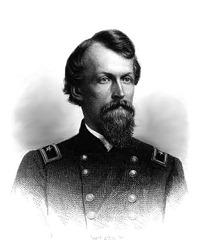September 26.—The Fifth and Sixth regulars, with Capt. Robertson’s battery of horse-artillery, went out from Bolivar Heights, Md., on a reconnoissance, under command of Major Whiting of the Second cavalry. At Halltown, five miles off, they encountered the rebel pickets, and drove them in. Approaching within a mile and a half of Charlestown, they met the rebels in force, with infantry, cavalry, and one battery. There was considerable picket-firing, but no casualties on the National side. The expedition, ascertaining that the enemy occupied Charlestown in force, returned, bringing five or six prisoners. Several of them rode horses branded “U. S.,” which they said were captured at the first Bull Run battle.
—The rebel General Bragg issued a proclamation from Bardstown, Ky., addressed to the people of the North-Western States, announcing the motives and purpose of his presence with an army among them. He informed them that the free navigation of the Mississippi River was theirs, and always had been, without striking a blow.
—A skirmish took place near Warrenton Junction, Va., between a reconnoitring force of Union troops, under the command of Col. McLean, and a body of rebel cavalry, resulting in a rout of the latter, leaving in the hands of the Nationals a large quantity of commissary and quartermaster’s stores.
—The Twenty-sixth New-Jersey regiment, one thousand strong, left Newark, N. J., to-day, en route for the seat of war.—The Twenty-third regiment New-Jersey volunteers, Col. Cox, one thousand strong, fully equipped, left Camp Cadwalader this morning, in steamers, for Washington.
—In the rebel House of Representatives majority and minority reports were submitted by the Committee on Foreign Affairs, to whom had been referred certain resolutions relating to the policy of the war, and which recommended to Jeff Davis the issuing of a proclamation offering the free navigation of the Mississippi River and its tributaries, and the opening of the market of the South to the inhabitants of the North-Western States, upon certain terms and conditions.—An unsuccessful attempt to capture the steamer Forest Queen was made at Ashport, Tenn., by a band of rebel guerrillas under Capt Faulkner.— Louisville Journal, September 30.
David Bell Birney (May 29, 1825 – October 18, 1864) was a businessman, lawyer, and a Union General in the American Civil War. Birney entered the Union army just after Fort Sumter as lieutenant colonel of the 23rd Pennsylvania Volunteer Infantry Regiment, a unit he raised largely at his own expense. Just prior to the war he had been studying military texts in preparation for such a role. (Wikipedia)



